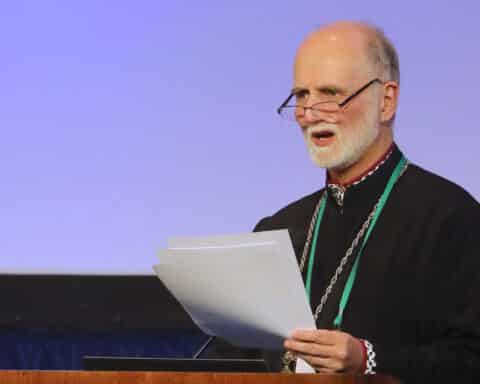It is now a cliché that 2020 has been quite a year: the cost of lockdowns on family and finances, loss of loved ones, isolation, fear of contracting illness, anxiety, depression, the election — the list goes on. Everyone is ready for 2020 to be over, with much hope that 2021 will bode better things. After such a long year of trials, have you asked yourself how you’re doing? Do you really even know?
Knowing how to discern one’s emotional and mental health is important. However, as a psychotherapist for the past 35 years, I’ve found that people often associate the term “mental health” only with health of the mind. Instead of this view, we might be better served to look at both mental and emotional health together, as each is intertwined with and influences the other.
Psychological wholeness
Christians may be helped by using the lens of “psychological wholeness” (coined by my father, Catholic psychiatrist Conrad Baars). This concept is based on the anthropology of St. Thomas Aquinas and more aptly describes a healthy balance between feeling and thinking, and how each supports the other and how together they strengthen the person. What this means is that God has designed our human nature — body and soul — in a particular way so that we may honor not only what reason tells us but also what our feelings and emotions convey to us.
Naturally, although the emotions have an important role to play in our happiness — even in becoming virtuous — this is not to say that the emotions are in charge. The human person is more than the sum of his or her parts.
The emotions — just like all the parts of the body — have their rightful place in a person’s life. This truth about human nature can serve to support one’s faith in a loving God who desires the best for us and has created us to desire him. Our feelings and emotions, which aim to help us realize what we are attracted to, can help us to realize all that is good. They can also lead us to know him, our Supreme End in life, more deeply.
Ensuring health
How then might we go about gauging our psychological wholeness — our mental and emotional health? Naturally, there are many ways available to assess for depression and anxiety. What I’d like to propose is a way to reflect on both our power of reasoning and on our emotions: a way to develop our psychological wholeness and hence a means to ensure our mental and emotional health.
St. Thomas Aquinas‘ main tenet in his psychology is this: It is the nature of the passions — for example, emotions — to be guided by reason. This means that reason listens to and considers what the emotions say — that is, reason is not to repress, ignore or discount the emotions.
Just like children do better when parents consider their feelings and reasonably answer them, according to their age level, so, too, do the emotions. Our emotions require consideration and acceptance. Emotions are designed to arise naturally and spontaneously when a person is moved by an idea, a person, an experience, whether they experience this as pleasant or unpleasant, good or bad, useful or harmful. They can inform us in a way distinct from reason.
The extremes
It has been my professional experience that many Catholics and other Christians who seek counseling go to an extreme, ignoring their feelings and emotions entirely. They report doing this for a variety of reasons.
They believe they shouldn’t feel a certain way (such as feeling angry, sad, depressed, hurt, annoyed, anxious, etc.). They discount their feelings for such reasons as “others have it so much worse than I do,” or they believe they should just “power through.” They’ve been taught that emotions will lead them astray or are not important, that they should simply rely on their willpower.
Sometimes they even believe that certain feelings and emotions are morally wrong in themselves. In some cases, people have reported that no one ever asked them how they felt about anything or encouraged them to dream (because it won’t happen anyway!), so they have no reference point at all for their internal experiences. Their feelings had never been addressed or affirmed as they grew up, and the resolution of conflict had not been modeled. These people were unaware that it is possible to identify and address their emotional reactions in a reasonable way.
To the contrary, rather than argue with ourselves about whether we should or should not allow ourselves to feel our emotions, let’s begin with the fact that we do feel this or that, and simply permit ourselves to experience that feeling. Perhaps emotions have something to say that we cannot get to through reasoning. This is just being honest with ourselves and requires no action whatsoever. It’s best that we not do anything with our emotions, as we first need to become familiar with and used to the feelings themselves. Our emotions are our friends, in a similar way that our feet and hands are allies to live our lives happily.
Gauging our psychological health
By now you are wondering how all of this helps us to gauge our own psychological health. Our “feeling temperature” is a powerful but simple tool for recognizing what is happening internally. We can then reflect on what actions are most reasonable and prudent in response. Without the balance of feelings and reason, we are either at the mercy of our feelings and emotions or we are totally cut off from what they convey and have to operate solely on the level of the mind. In either case, life becomes much more difficult; it’s like breathing with only one lung.
Analogously, if people were unaware of their bodily feelings, or always ignored them, what might happen? In extreme cases, a person’s appendix could burst if he ignored the pain, or bodily injuries might occur when people continue to push themselves without regard for the pain they are feeling (“feel the burn,” or “powering through”). Similarly, problems may also occur when we disregard our emotions.
In effect, taking the time to develop our psychological wholeness by noticing and becoming aware of our physical feelings, as well as our emotional states, gives us a better sense of how things affect us. This awareness allows us to realize what we want and what we don’t want.
Newfound attentiveness

With time and practice, this newfound attentiveness makes coming to a decision easier and less of a mystery. We don’t have to rely only on reason to figure out the “right” thing to do; that can be exhausting. Emotions are present to give information differently. Emotions help us to see whether we like a thing or not, whether things are pleasant or not.
Some readers may be thinking, so what? We still have to do this thing anyway. While it is true that there are always things we will need to do despite how we feel, to only do things because it is our duty is a dry, joyless life. When possible, making choices based on what we desire and what is attractive to us (given that it is truly good for us and/or others) can bring more joy and lighten the burdens of life. Affirming how we truly feel can bring relief even in cases when we have to use our will to turn away from what we prefer in favor of doing something difficult but right.
Psalm 139 tells us that the Lord has made us “wonderfully and fearfully.” God’s plan for our psychological wholeness is truly something that may evoke gratitude in us as we look forward to 2021.
Dr. Sue Baars is a licensed professional counselor and marriage and family therapist in Irving, Texas, where she operates her private practice, In His Image Christian Counseling.





